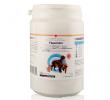
Did you know that North America is home to over 70 parasite species or species groups that can infest your pet? Some could cause mild discomfort, while others could be fatal. Some can even be transmitted to humans, with serious repercussions, especially for children and people with a weakened immune system.
To give you a clearer idea, here are some factors that can affect your pet’s risk of infection and that emphasize the importance of preventive care:
- Your pet’s age and health status (Is it very young or very old, or does it have a serious or chronic health condition?)
- Your pet’s lifestyle (Does your pet spend a lot of time outdoors? Does it hunt? Is it in contact with other animals? Does it go to a dog park or board at a kennel? Do you travel with your pet?)
- Where you live (What parasites are found in your area?)
- Your family (Do you live with young children or adults with weakened immune systems?)
You need to share the answers with your vet, because he or she is the best person to recommend a parasite-protection program.
The Most Common Parasites in Canada
External Parasites
Fleas: Fleas cause discomfort and irritation to pets and sometimes to people. Both animals and people who are allergic to flea saliva develop skin rashes and severe itching. Too much scratching can even lead to skin infections in pets. In addition, fleas can be intermediate hosts for tapeworms in dogs and cats. Lastly, flea bites are the main cause of transmission of feline infectious anemia.
Ticks: Climate change is aiding the spread of ticks in Canada. This topic has been making news because some ticks can transmit Lyme disease to pets and people. This disease can become serious if untreated.
Mites: Mites belong to the acarid family, like ticks, but they are microscopically small. Although they can’t pass on disease, as ticks do, they can sometimes cause discomfort and intense itching in both pets and people.
Internal Parasites
Heartworm: This parasite spreads through a simple mosquito bite. As its name suggests, it lodges in the heart and so can be serious, even fatal. The incidence of heartworm in Canada is still low because our climate limits the host mosquito’s survival.
Intestinal worms (tapeworms, hookworms, whipworms): These parasites can be well tolerated, but they often cause digestive upset (diarrhea that can sometimes be bloody; vomiting) or weight loss. Some can be transmitted to people, especially children. They are rarely symptomatic, but when they are, they can be serious.
Giardia: This is the most common intestinal parasite in dogs and cats. The symptoms of infection can vary widely, from mild bloating to bloody diarrhea. Stool analysis is required to diagnose giardia.
Prevention and Protection:
- Take your pet to the vet’s for an annual checkup. It’s important preventive step that will help protect both your pet and your family.
- Follow the treatment plan recommended by your vet for your pet’s lifestyle.
- Pick up and dispose of your pet’s stool daily to keep its environment clean. Wash your hands afterwards.
- Keep children away from places where animal feces are likely to be found.
- Cover your children’s sandbox when it’s not in use.
- Don’t feed your pet raw meat.
Tips & Tricks
- Here are some tips to ensure your guests know how to interact with your dog during the Holiday season.
- Here are some tips to ensure a more pleasant stay for your friends and family with cat allergies.
- Do you know what pet insurance can cover? Here’s how it works.
- Contrary to dogs, cats have a profound hatred of costumes. Here’s why.
Products
- Zentonil®, to help support the cognitive function of aging pets, will help when your pet's liver is compromised…









